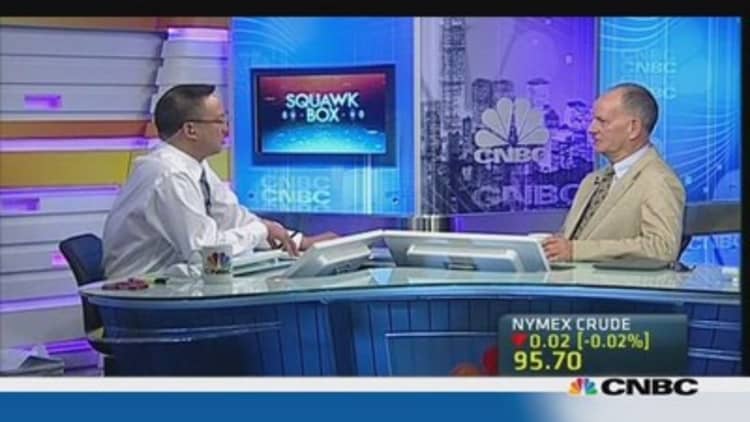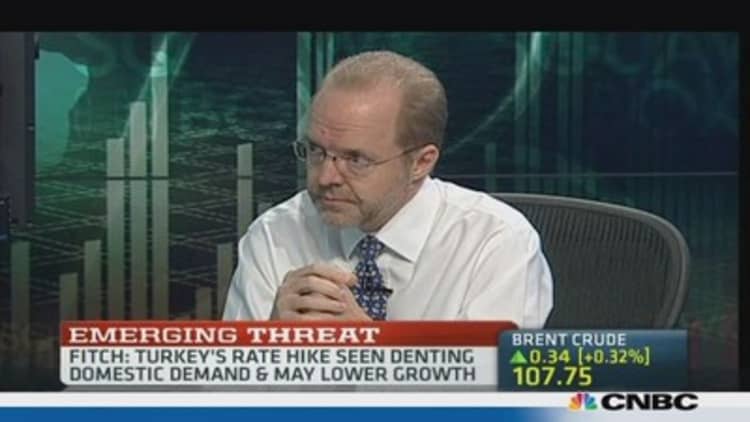With Europe's already low inflation headed toward deflation and the risks of a China hard landing spurring jitters, markets may be headed for a perfect storm, Societe Generale said in a note.
Markets have opened the year with a broad-based selloff, driven in part by jitters over emerging markets, and analysts have been looking for signals on whether the turmoil is a one-off or if it is likely to persist and even spread.
Societe Generale is concerned policy moves in Europe and China could offer triggers for greater turmoil.
(Read more: What happens in EM stays there, mostly: Goldman)

"The risk of a hard-landing of the Chinese economy is not negligible," the bank said. "The most likely trigger is that Beijing's gradual deleveraging plan gets out of control, which would lead to shadow banking failures, a liquidity crunch and financial market turmoil."
While it believes the drop in China's official manufacturing PMI to a six-month low in January was partly due to the Lunar New Year holiday, "it is getting clearer that the economic slowdown has begun again."
Its base case is for a "bumpy landing" in China, with a below-consensus forecast for 6.9 percent gross domestic product (GDP) growth in 2014 amid a continued slowdown in credit growth.
(Read more: What the EM sell-off means for European stocks)
"Decelerating investment growth will most likely follow and, more importantly, we expect disruptions in the Chinese financial market," it said, noting that although China avoided a trust product default last week, more defaults will likely occur this year.
"Having defaults is a necessary condition for a healthy financial market (thus good for the long run). Nonetheless, the transition away from 100 percent state guarantees will be nothing but risky," the note said.
(Read more: Why people fear a shadow banking crisis in China)
Meanwhile, the bank is concerned Europe's low inflation could be headed toward deflation, saying the region's reforms don't appear to be enough to raise growth and keep public debt trajectories at sustainable levels.
"Notwithstanding the current signs of a genuine cyclical upturn in Europe, we fear that the lack of growth-enhancing reform will soon again show up in disappointing nominal growth," it said.
In addition, it noted January's headline inflation of 0.7 percent was lower than expected again. It expects the European Central Bank (ECB) may soon need to act to prevent inflation from weakening further.

"A key question still relates to what the ECB would do in case of real deflation (self-fulfilling price declines feeding recession)," it asked, noting the bank's president recently reiterated that the central bank faces a prohibition against buying government bonds.
To be sure, not everyone expects a "contagion" or "perfect storm" to spur wide-ranging turmoil. Rather than spreading the pain, some expect some regions to benefit at the expense of others.
"Recent data and events in emerging markets and developed markets nicely serve to illustrate the yin-yang character of the global economy and markets," Joachim Fells, an economist at Morgan Stanley, said in a note. "What's good for one region may be bad for another, and those focusing on only the good or only the bad risk missing the bigger picture."
(Read more: Why emerging market concerns could boost US stocks)
He expects better growth in the U.S. may be weighing on emerging markets as American reindustrialization harms other regions' manufacturing platforms and as rising developed market interest rates hit highly leveraged emerging-market economies.
In addition, he expects the turmoil in emerging markets will be good news for developed market consumers as it weighs on commodity prices and makes emerging market exports cheaper for developed economies.
—By CNBC.Com's Leslie Shaffer; Follow her on Twitter @LeslieShaffer1

